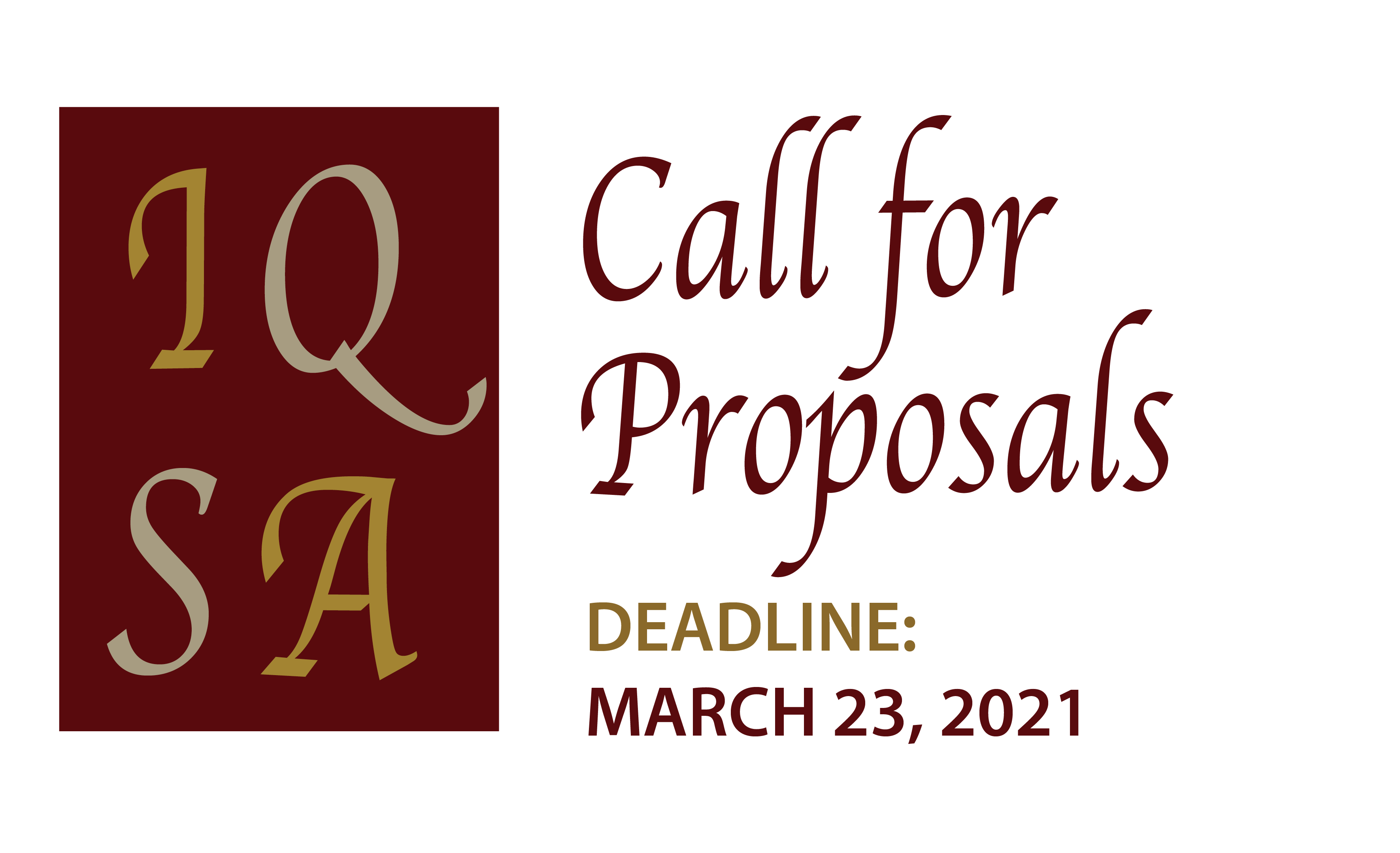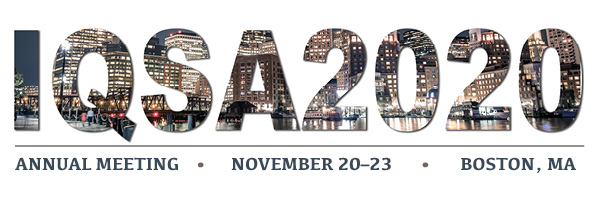Deadline Approaching: IQSA 2021 Annual Meeting Call for Papers
 The Call for Papers deadline for the IQSA Annual Meeting to be held in San Antonio, TX from November 18–21, 2021 is quickly approaching! Paper proposals should be submitted through the SBL’s automated online submission system under the corresponding “Affiliates” link by March 23, 2021 though 11:59 PM (23:59) Eastern Standard Time (UTC-5) (note: IQSA membership is required for proposal submission; see below). Submission links can be found below under the respective program units. If you require further information or experience difficulties with the submission process, please contact the chairs of the program unit to which you would like to apply.
The Call for Papers deadline for the IQSA Annual Meeting to be held in San Antonio, TX from November 18–21, 2021 is quickly approaching! Paper proposals should be submitted through the SBL’s automated online submission system under the corresponding “Affiliates” link by March 23, 2021 though 11:59 PM (23:59) Eastern Standard Time (UTC-5) (note: IQSA membership is required for proposal submission; see below). Submission links can be found below under the respective program units. If you require further information or experience difficulties with the submission process, please contact the chairs of the program unit to which you would like to apply.
Please note that all proposals must include:
- Author name and affiliation
- Paper title
- 400 word paper abstract (written in English)
Eligibility for proposal submissions is contingent upon the following:
- Active IQSA membership is required at the time of proposal submission for the IQSA Program, and the membership status of all applicants will be checked prior to acceptance
- Participants must maintain current IQSA Membership through their participation in the Annual Meeting
Please also note that:
- To ensure equity and diversity amongst participants, participants should submit only one paper presentation per IQSA Annual Meeting
- All participants must adhere to IQSA’s Professional Conduct Policy
- Participants will be required to register for the conference by submitting payment through SBL’s online registration system (users are strongly encouraged to take advantage of the “Super Saver” rates which end mid-May)
The Annual Meeting includes panels for each of IQSA’s seven program units:
Linguistic, Literary, and Thematic Perspectives on the Qur’anic Corpus
The Qur’an: Surah Studies
Qur’anic Studies: Methodology and Hermeneutics
The Qur’an: Manuscripts and Textual Criticism
The Qur’an and the Biblical Tradition
The Qur’an and Late Antiquity
The Societal Qur’an
PROGRAM UNIT 1
Linguistic, Literary, and Thematic Perspectives on the Qur’anic Corpus
Program Unit Chairs
Anne-Sylvie Boisliveau
Mohsen Goudarzi
The Linguistic, Literary, and Thematic Perspectives on the Qur’anic Corpus unit invites proposals for papers that engage with the techniques utilized in the Qur’an for crafting imagery, characters, and narratives. Proposals may attend to artistic and literary strategies as well as to the broader social, religious, and political ends towards which these strategies are deployed
PROGRAM UNIT 2
The Qur’an: Surah Studies
Program Unit Chairs
Nevin Reda
Shawkat Toorawa
The Surah Studies Unit invites proposals for individual papers on any aspect of Surat al-Naml (27, “The Ants”). Much of the attention directed at the surah has focused on the story of Solomon and the Queen of Sheba. Proposals about any aspect of that narrative are welcome—in particular ones that explore power and gender dynamics—but proposals that can take our thinking about the surah in new directions are especially encouraged. These might broach such topics as: the deployment of animals as characters; the nature of the Arabian prophets’ missions; the role of the surahs’s inaugurators (fawati?), ?a Sin, both in the surah and within the Qur’an as a whole; the rhetorical relationship between the various prophets and prophet-stories; miracles; and much else besides. The Surah Studies Unit welcomes diverse methods and new approaches. The raison d’être of the Unit is to bring different perspectives on a given surah into dialogue with one another.
PROGRAM UNIT 3
Qur’anic Studies: Methodology and Hermeneutics
Program Unit Chairs
Khalil Andani
Celene Ibrahim
This unit aims to understand and contextualize the methods and hermeneutics applied to the Qur’anic text, both historical and contemporary. The Methodology and Hermeneutics unit addresses questions that might implicitly govern other units, such as: What is Qur’anic Studies, and how does the study of the Qur’an differ from the study of its interpretation? What are the methodological differences between descriptive and normative approaches to the text? How does context (intellectual, social, ethical, historical) affect hermeneutical approaches to the text? The unit welcomes papers addressed to the hermeneutics and methods of particular schools of interpretation or thought, and also on hermeneutics as applied to specific subjects or concepts such as social justice and gender. This year the Methodology and Hermeneutics Unit invites submissions for two panels on any aspect of Qur’anic interpretation, hermeneutics, and methodology. Proposals can focus on, among other topics, the following areas:
• The overlaps and distinctions between tafsir and ta’wil in exoteric and esoteric Qur’an commentary literature as they have evolved historically;
• The distinctive hermeneutical features of Qur’anic exegesis performed by minority Muslim communities including Sufi and Shi‘i (Twelver, Ismaili, Nusayri) commentators;
• How the Muslim Peripatetics (falasifa), such as Avicenna, have engaged with the Qur’an through Aristotelian and Neoplatonic lenses;
• The unique hermeneutical approaches of Muslim modernist thinkers in the 19th and 20th centuries;
• Interpretative engagements with the Qur’an from thinkers in South Asia and Southeastern Asia.
Any other topic that deals with Qur’anic hermeneutics is welcome.
PROGRAM UNIT 4
The Qur’an: Manuscripts and Textual Criticism
Program Unit Chairs
Alba Fedeli
Shady Hekmat Nasser
The aim of the Manuscripts and Textual Criticism unit is to provide a cross-disciplinary setting for the exploration of the various interconnected issues that arise when questions concerning the Qur’an’s text are investigated through the prism of its manuscript tradition. This latter term encompasses the field of Qur’an manuscripts per se, but also alludes to such information regarding the history of the text that can be gleaned from the citations, marginal notes, and detailed analysis provided in other branches of the Islamic sciences, for example Qur’an commentaries and the qira’at literature. It is hoped that bringing together scholars from a variety of disciplines will serve to enrich and strengthen each of these fields. The Manuscripts and Textual Criticism unit seeks to create a forum for the application of textual criticism to the Qur’anic text attested both in physical manuscripts and within the wider Islamic tradition. It also aims to investigate palaeographic, codicological, and art historical features in the Qur’an’s manuscript tradition.
The unit welcomes papers on any topic within the range of the interests of the Manuscripts and Textual Criticism program unit. In addition, the unit proposes a special thematic session for 2019: “Life of Qur’an manuscripts.” We invite proposals that touch upon issues related to the modification of manuscripts after they have been produced. Papers dealing with all eras and regions of the manuscript tradition are welcome. Submissions might focus on the insertion of marginalia notes, colophons, waqf statements, annotations, additions, amendments, the recycling of writing surfaces, etc., or on references to such practices in the traditional literature.
PROGRAM UNIT 5
The Qur’an and the Biblical Tradition
Program Unit Chairs
Nora K. Schmid
Holger Zellentin
The focus of this unit is the Qur’an’s relationship to the Biblical tradition in the broadest sense: the books of the Hebrew Bible and the New Testament in the various languages of their original composition and later translations (regardless of a particular book’s status of canonization within specific Jewish or Christian groups), as well as the exegetical, homiletic, and narrative traditions of the Bible in written or oral form. For the 2021 meeting in San Antonio, the Qur’an and the Biblical Tradition unit welcomes proposals that engage any aspect of the relationship between the Bible and the Qur’an.
PROGRAM UNIT 6
The Qur’an and Late Antiquity
Program Unit Chairs
Johanne Christiansen
Michael Pregill
For the 2021 IQSA Annual Meeting in San Antonio, the Qur’an and Late Antiquity program unit invites proposals that utilize various types of material or evidence—be that literary, documentary, or epigraphic—to illuminate the historical context in which the Qur’an was revealed and the early Islamic polity emerged. This year, we are especially interested in papers that present and discuss the historical Muhammad, including new and comparative methodologies to approach this figure, the relationship between Muhammad and the Qur’an, and Muhammad’s role and function in the cultural, political, social, and religious environment of Late Antiquity.
PROGRAM UNIT 7
The Societal Qur’an
Panel Chairs:
Johanna Pink
Lauren Osborne
The Societal Qur’an unit invites proposals for papers that investigate the Qur’an in its lived and societal contexts throughout history, from Late Antiquity to contemporary Late Modernity. Proposals are encouraged that engage with sociological, anthropological, and political science theories and methods in their pursuit of the societal and lived Qur’an. Papers might, for instance, discuss topics such as ritual and artistic uses of the Qur’an, practices of teaching the Qur’an, talismanic and medical uses of the Qur’an, the production of manuscript, print, and new media versions of the Qur’an, or the deployment of the Qur’an in terms of social identity and political organization.
Questions? Email IQSA at contactus@iqsaweb.org!
© International Qur’anic Studies Association, 2021. All rights reserved.



